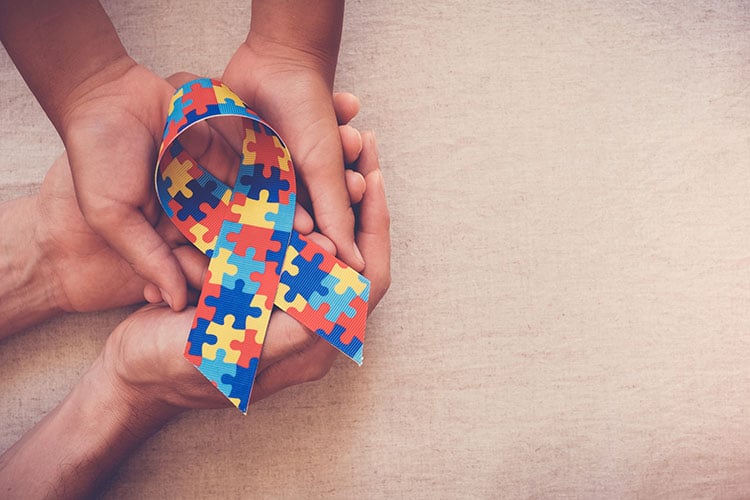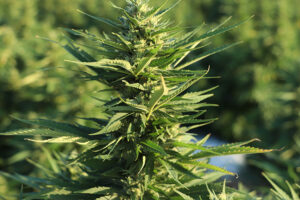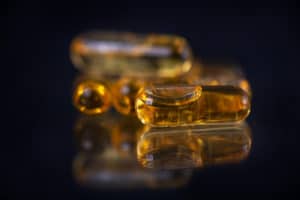Autism affects one out of every 40 American children today, according to the American Academy of Paediatrics. ASD (or Autism Spectrum Disorder) impacts social skills and development, with symptoms ranging from relatively mild to severe, including potentially harmful behaviors. While several interventions can help children and adults with autism cope and live independently, there is no known cure.
As medical marijuana becomes more and more popular, parents have turned to CBD oils in an attempt to cure or help their children manage the symptoms of autism. There are hundreds of stories and testimonials about how CBD oil has helped people with autism manage their condition. Unfortunately, there are very few formal studies examining the therapeutic effect of CBD on autism, which makes it difficult to know whether CBD can truly help manage the symptoms of the disorder. Until more studies are published, the case for CBD helping with autism remains murky and contradictory.
What is CBD?
Cannabidiol, or CBD, is one of two well-known compounds found in marijuana. It is a cannabinoid that interacts with receptors on the brain known as the endocannabinoid system. Unlike the other well-known cannabinoid, THC, CBD doesn’t produce feelings of euphoria or the traditional ‘high’ associated with marijuana use. Instead, CBD may have numerous medical benefits, such as helping manage the symptoms of anxiety and depression, as well as alleviating pain and reducing the incidence of epileptic seizures.
See all CBD oil benefits here.
CBD is usually extracted from hemp, which is a close relative of the marijuana plant. Hemp contains very low levels of THC, which means that hemp extracts will contain almost pure CBD without any THC contamination.
People consume CBD in a wide variety of ways, from edible gummies to tinctures, and even as an inhalable. How you choose to ingest CBD will depend on your own personal preferences and which method you find most convenient.
You may also notice that CBD products are sometimes labeled as ‘full spectrum’ or as ‘isolate.’ Full-spectrum CBD is a less-processed extract that will contain many of the other cannabinoids and compounds found in the original plant. Some scientists speculate that these unknown compounds may enhance the effect of CBD, though very few studies have provided evidence to verify this. Indeed, there are hundreds, if not thousands, of unknown compounds. Identifying them and their interaction with CBD is a monumental task.
Isolate CBD, on the other hand, has been processed more thoroughly to remove all extra compounds other than CBD. What you get in the bottle is pure CBD with no additives or extra unknown terpenes or cannabinoids. It’s a safer and more reliable option than full-spectrum (which can vary from batch to batch and vary between different manufacturers).
Current Studies and Published Results
Preliminary research studies
To date, there have only been four studies that have looked at the direct effects of CBD on patients who have ASD. The results of these studies offer contradictory evidence with regards to the efficacy of CBD, as well as the prevalence and severity of the side effects experienced by the study participants.
The most recent study examined the efficacy of CBD oil on 188 patients with ASD. The patients received a dose of cannabis oil containing 30% CBD and 1.5% THC, and the study looked at the impact of this dose on the participant’s daily living, mood, and quality of life. Only 93 of the original cohort completed the 6-month follow-up. Of these, approximately 33% reported a significant improvement in their daily life, mood, and quality of life. 25% of patients reported side effects, including restlessness, sleepiness, or psychoactive effects. The main drawback of the study is the low follow-up rate, which the researchers failed to explain.
Another Israeli study administered oral cannabinoids to 53 ASD-suffering children under adult supervision. The children received the recommended daily cannabinoid dose of 16 mg/kg of CBD and 0.8 mg/kg THC for 66 days, and the effect on sleep activity, hyperactivity, and self-harming behavior was evaluated. 68% of children with hyperactivity reported an improvement in the behavior, while 28% reported no change. The study reported similar numbers for self-injury and sleep activity. The study noted few side effects, including decreased appetite and increased drowsiness in 6 and 12 children respectively. The main drawback of the study is that it didn’t include a control group and relied on parental feedback without a clear, objective assessment tool. The parent’s perception may likely have skewed the results, and this outcome was not accounted for, making the results of the study unreliable at best.
A third study conducted in Israel followed a similar procedure like the one above, but with more robust assessment tools. The study found that the behavioral problems in 61% of the children improved to some degree, according to parental feedback. However, the study also noted adverse effects in 57 of the 60 participants, including hypervigilance, loss of appetite, irritability, and restlessness. One patient even suffered a transient psychotic event, probably due to the high THC concentration in the cannabinoid treatment. The authors of the study failed to have a control group and failed to account for any potential placebo effect, which again put the findings of this study in doubt. Placebo effects have commonly been found to be a massive factor in studies of children with ASD, sometimes skewing study results with false-positives.
The fourth study looked at 20 children and one adult with ASD. The participants were given whole-plant sublingual extracts: CBD extract, high-CBD extract, or high-THC extract, though the study didn’t note the exact dosages in their published results. The parents assessed behaviors according to the Autism Parenting Stress Index and Clinical Global Impression of Improvement indexes. Over 66% of participants showed an improvement in at least one symptom of ASD. Three of the 20 patients suffered adverse symptoms such as increased agitation or irritability, though these symptoms stopped after changing cannabis strains. Again, as with the other studies, the research methodology was severely flawed as it relied on parental reporting and lacked a control group. The fact that dosages weren’t measured also presents a cause for concern.
Clinical trials
There are currently three ongoing clinical trials examining the effect of CBD on patients with autism spectrum disorder. The first study compared the effect of a single dose oral dose of CBD on the brain of individuals with or without ASD. The authors discovered that CBD affects the pre-frontal GABA systems of ASD patients differently than it did in neurotypical populations. This finding suggests that CBD may affect ASD patients differently from the neurotypical population. It also highlights the fact that the results of studies of CBD on neurotypical populations may not necessarily carry over to populations with ASD.
The second clinical trial looks at children and youth with behavioral problems and whether a cannabinoid mix containing CBD can alleviate these issues. The study looks mainly at the efficacy of CBD in helping these children manage their behavioral problems, while also looking at the safety and tolerance of CBD. The study ended recently, and the scientific community is eagerly awaiting the published results.
The third clinical trial is funded by the US Department of Defence and is looking at the effect of cannabidivarin, a molecule similar in structure to CBD, on children with ASD. The study seeks to examine whether or not CBD is a suitable alternative to existing drugs that help reduce the irritability that affects many patients with ASD. The current therapies for irritability are effective but have significant side-effects, including weight gain, growth of breast tissue, and increased risk of type 2 diabetes. The researchers believe that CBD can reduce irritability in children with ASD without the risk of these harmful side-effects. The study is a 12-week randomized, double-blind study with over 100 participants, and the estimated completion date is late 2021.
Conclusion
While there may be a lot of anecdotal evidence suggesting that CBD is useful in helping manage the symptoms of ASD, the current research doesn’t decisively prove this claim. That isn’t to say that it isn’t true, as most of the studies have had severe flaws in their methodology, which makes the results unreliable at best.
CBD is becoming one of the most-studied therapeutic agents for neurological disorders due to its effect on the endocannabinoid system. This increased popularity means that more and more researchers will start investigating whether or not CBD is a viable therapy for autism. As higher-quality studies get published, the picture will hopefully become clearer, both in terms of the efficacy of CBD and its potential side effects. There are at least two clinical trials that will produce results soon, results that should at least provide preliminary evidence to say whether CBD is a viable treatment for autism. Until then, be very careful about CBD oil manufacturers making claims about their product that they can’t back up with solid evidence.
FAQs About How CBD Work For Autism
Question: Does CBD Work For Autism?
Answer: There are many claims telling how CBD oil helps to treat autism patients. Unfortunately, there are very few formal studies examining the therapeutic effect of CBD on autism, which makes it difficult to know whether CBD can truly help manage the symptoms of the disorder. Until more studies are published, the case for CBD helping with autism remains murky and contradictory.
Question: Is there a research regarding the effects of CBD oil for autism?
Answer: Yes. Currently, there are 4 research studies conducted on the effects of CBD oil in autism. The results of these studies offer contradictory evidence with regards to the efficacy of CBD, as well as the prevalence and severity of the side effects experienced by the study participants.
Question: Are there clinical trials examining the effects of CBD on patients with autism?
Answer: As of this writing, there are 3 clinical trials regarding the effects of CBD on patients with autism.
Question: What are the benefits of CBD Oil?
Answer: CBD may have numerous medical benefits, such as helping manage the symptoms of anxiety and depression, as well as alleviating pain and reducing the incidence of epileptic seizures.
Question: What are the common types of CBD products?
Answer: Isolate CBD, Full Spectrum CBD, and Broad-spectrum are the most common types of CBD products.






